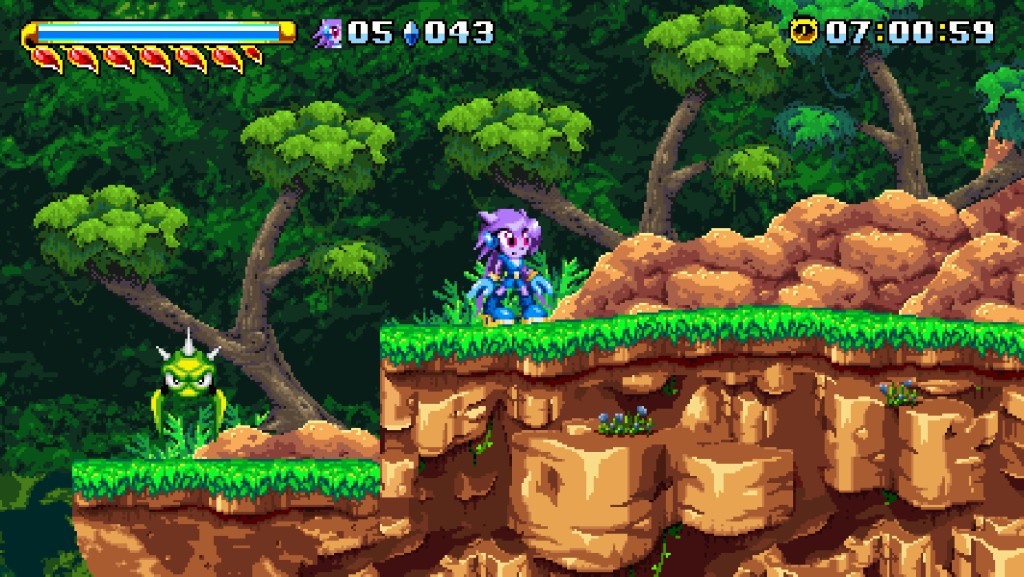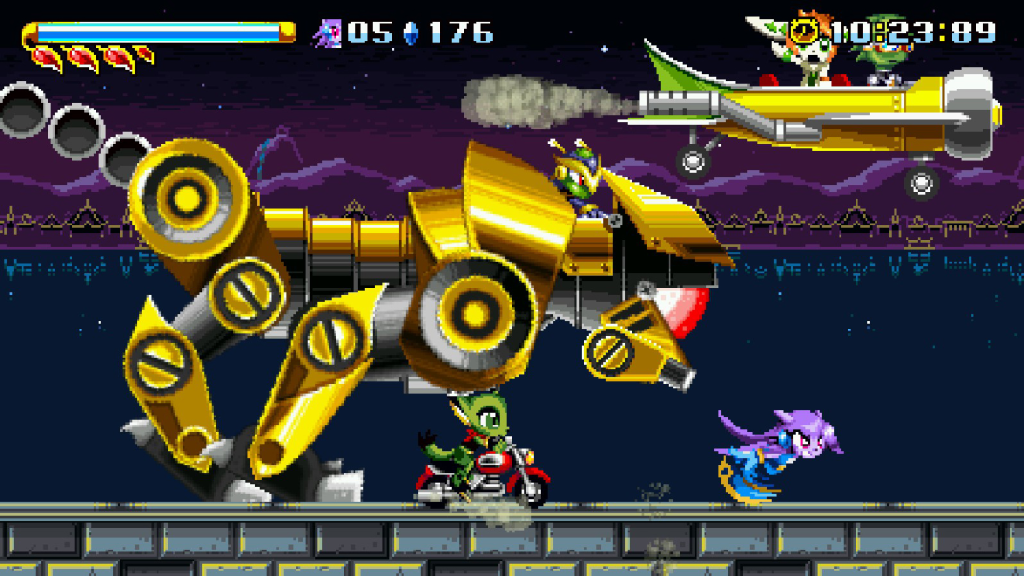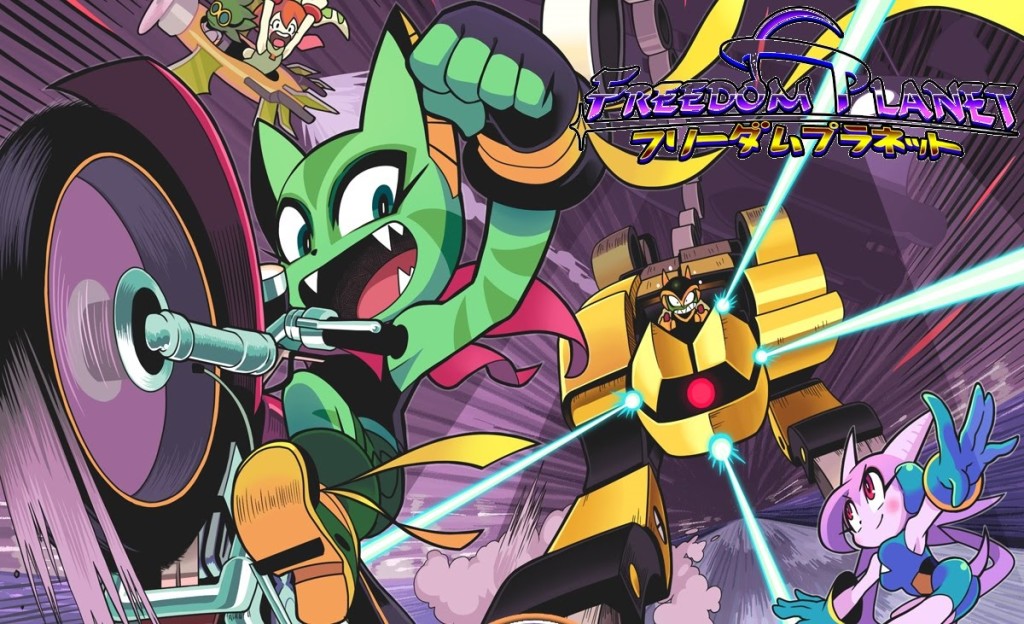Last updated on November 19, 2015
Freedom Planet seems like a game out of time, arriving from a distant dream world where Sega created a franchise that was sorta like Sonic the Hedgehog, but not. GalaxyTrail clearly show a great deal of love for Sega’s blue blur, and Freedom Planet seeks to hold the torch while Sonic Team does whatever the heck it’s been doing with Sonic for the past decade and a half. As a sort of tribute to the “golden age” of 16-bit platformers, how does it stack up? Surprisingly well! There’s a clear effort to copy Sonic’s fast speed, labyrinthine level design, and boss fights (without life bars…). It also replicates its cutesy aesthetics, with a more feminine focus (given the three leads are girls animal things, this makes sense).
Also, I need to point out how absolutely amazing this game looks. Freedom Planet began as a Sonic fan game, that much is clear, but GalaxyTrail came up with their own universe of furry people to battle against an outside force. I’ll admit, right here and now, that I had no interest in Adventure Mode (which meanders with long-winded, animal-based exposition), but Classic Mode exists just for people like me. Classic presents you with a cold open, and away you go; I got the majority of the plot just from playing it, mostly wordlessly, and it reminded me a good deal of the early 1990s. There’s wasn’t anything but a game, and if you wanted the rest, go get an instruction booklet. I much appreciated this feature as I honestly knew it was going into convoluted Sonic territory in anime style (Armored Hunter Gunhound wasn’t too kind in this regard), but I’m glad they let me skip it if I want. The game, for its part, holds up spectacularly well without any kind of plot at all.

Freedom Planet makes absolutely clear improvements to the Sonic formula, to the point where you wonder why Sega couldn’t think of it. One of the primary problems in Sonic games derives from the difference between the promise of its advertising (BLAST PROCESSING! SPEED!) and what you actually get (EXTENDED BORING OBSTACLE COURSE THAT RECOMMEND YOU SHOULDN’T MOVE VERY FAST!). The level design, in my mind, has always been one of the downfalls of the classic Sonic games; they’re simply too big, and they reward exploration in a game about going fast while missing things. The palette swapped backgrounds mean you get lost fairly quickly as you go both left and right, and figuring out where the designers want you to proceed turns frustrating. Add in the absolutely horrific water stages, where Sonic slowly runs out of life in movement-impairing water, and Sonic often frustrates more than it satisfies.
Freedom Planet does not, for the majority of the game, have this problem. That’s because it takes a few notes from Treasure along the way, specifically in terms of melee combat. Each and every character (of three selectable ones) has a variety of attacks. Unlike Sonic, you can actually combo enemies with various dashing attacking, jumping spin moves, and (yes, not kidding) dragon uppercuts. The base combat supplements the platforming in a natural way, as a lot of them offer invincibility frames to prevent you from taking damage. You’ll need these to move around safely, and also position yourself to not die from the enemy onslaught of the later stages. It sounds like this would slow down the action considerably, but trust me, it never does. It’s also nice that each successful hit is punctuated with the tiniest bit of screen pause to give you that extra bit of feedback.

While the game offers an expanded offensive moveset, with various attacks corresponding to one button and various directions, even this takes a backseat to speed. Each character uses an energy meter in the upper left hand corner of the screen to go really, really fast. The main character, Lilac, can use a speed boost in one of six directions (anything but straight up and down) which alleviates the problem of “slowing down”, and it also doubles as an offensive attack! Carol, on the other hand, uses a motorcycle (this is so weird, and I don’t understand it) to drive around at the same speeds, using the same button to boost fast; her default energy attack is a Chun-Li style kick, which makes her more offensive.. Even Milla, who’s rather slow by comparison, has her own techniques to move fast through stages (mostly by killing everything with ranged attacks). Thankfully, most of the levels seem designed around all three characters, which means none of them feel left out. Carol’s wall-jumping and jump pads prove useful, while Milla’s ability to create blocks and float through the air gives her a Knuckles vibe. As well, each character also has their own exclusive stage, which tends to emphasize their unique attributes, so you do learn their move sets rather naturally!
Honestly, the levels are such an improvement over Sonic levels for the most part. Unlike in Sonic games, you can always build your momentum back up, since the lead-up time is fairly fast. Even running up walls happens without a spin dash, which I guarantee you is a good thing! As well, you get a life meter in this game relative to rings in Sonic; getting hit doesn’t immediately stop you and make you lose all your health. Instead, you get hit, but you keep moving. This is a godsend, really! Of course, that health meter’s really used for combat, as you’ll need to dodge enemy attacks at the same time as you go fast. Thus, knowing your invincibility frames goes a long way to keeping your momentum, even when you don’t quite know where to go next (a Sonic hallmark, unfortunately). All in all, Freedom Planet nails that sense of speed that comes from mastery of the mechanics, rather than simply as a marketing gimmick. The developers even encourage speed runs, such as the one below; they clearly knew their audience!

